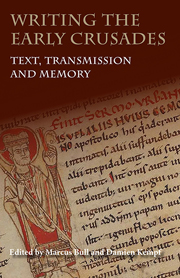Book contents
- Frontmatter
- Contents
- Acknowledgements
- List of Contributors
- List of Abbreviations
- Introduction
- Baldric of Bourgueil and the Familia Christi
- Guibert of Nogent, Albert of Aachen and Fulcher of Chartres: Three Crusade Chronicles Intersect
- Understanding the Greek Sources for the First Crusade
- The Monte Cassino Tradition of the First Crusade: From the Chronica Monasterii Casinensis to the Hystoria de via et recuperatione Antiochiae atque Ierusolymarum
- Nova Peregrinatio: The First Crusade as a Pilgrimage in Contemporary Latin Narratives
- What Really Happened to Eurvin de Créel's Donkey? Anecdotes in Sources for the First Crusade
- Porta Clausa: Trial and Triumph at the Gates of Jerusalem
- The Historia Iherosolimitana of Robert the Monk and the Coronation of Louis VI
- Towards a Textual Archaeology of the First Crusade
- Robert the Monk and his Source(s)
- Rewriting the History Books: The First Crusade and the Past
- The Ideal of Knighthood in English and French Writing, 1100–1230: Crusade, Piety, Chivalry and Patriotism
- Index
The Ideal of Knighthood in English and French Writing, 1100–1230: Crusade, Piety, Chivalry and Patriotism
Published online by Cambridge University Press: 05 May 2014
- Frontmatter
- Contents
- Acknowledgements
- List of Contributors
- List of Abbreviations
- Introduction
- Baldric of Bourgueil and the Familia Christi
- Guibert of Nogent, Albert of Aachen and Fulcher of Chartres: Three Crusade Chronicles Intersect
- Understanding the Greek Sources for the First Crusade
- The Monte Cassino Tradition of the First Crusade: From the Chronica Monasterii Casinensis to the Hystoria de via et recuperatione Antiochiae atque Ierusolymarum
- Nova Peregrinatio: The First Crusade as a Pilgrimage in Contemporary Latin Narratives
- What Really Happened to Eurvin de Créel's Donkey? Anecdotes in Sources for the First Crusade
- Porta Clausa: Trial and Triumph at the Gates of Jerusalem
- The Historia Iherosolimitana of Robert the Monk and the Coronation of Louis VI
- Towards a Textual Archaeology of the First Crusade
- Robert the Monk and his Source(s)
- Rewriting the History Books: The First Crusade and the Past
- The Ideal of Knighthood in English and French Writing, 1100–1230: Crusade, Piety, Chivalry and Patriotism
- Index
Summary
This paper seeks to re-examine a knotty problem: the extent and nature of the relation between the crusade movement and the knightly ideal of chivalry. My focus is on the lay, aristocratic culture of the Anglo-Norman world, as revealed by twelfth- and early thirteenth-century vernacular texts, and the study arose from a serious and simple question: round about when and, much more importantly, how did knights stop thinking that, inasmuch as they were knights, they were going to hell?
Certainly a change can be observed. There is no shortage of evidence for aristocratic fears of damnation in the eleventh and twelfth centuries; any number of pious gifts and bequests are recorded with the urgent prayer that they might deflect the wrath of God for the sins of the benefactor and his ancestors. Even more pointedly, hundreds of accounts survive of dreadful dreams and visions, including Orderic Vitalis's memorable story of the priest who encounters the tormented spirit of his dead brother, a knight:
‘… pro peccatis quibus nimis oneratus eram immania supplicia pertuli. Arma quae ferimus ignea sunt, et nos foetore teterrimo inficiunt, ingentique ponderositate nimis opprimunt, et ardore inextinguibili comburunt.’… stupensque sic interrogauit, ‘Vnde tanta coagulatio cruoris imminet calcaneis tuis?’ At ille respondit, ‘Non est sanguis sed ignis, et maioris michi videtur esse ponderis quam si ferrem super me Montem Sancti Michahelis. Et quia preciosis et acutis utebar calcaribus ut festinarem ad effundendum sanguinem, iure sarcinam in talis baiulo enormem, qua intolerabiliter grauatus nulli hominum depromere ualeo penae quantitatem.’
- Type
- Chapter
- Information
- Writing the Early CrusadesText, Transmission and Memory, pp. 155 - 168Publisher: Boydell & BrewerPrint publication year: 2014

